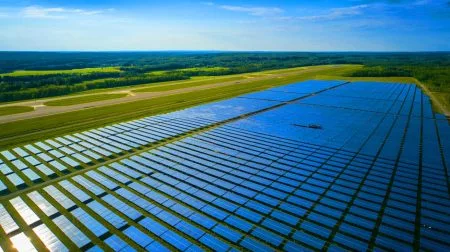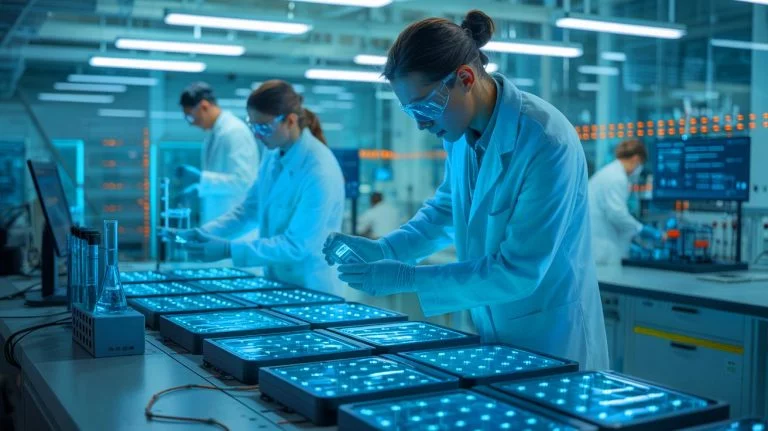| IN A NUTSHELL |
|
In a world increasingly reliant on sustainable energy, the development of efficient energy storage solutions is crucial. Recent research from the University of Alberta has made a significant leap in the realm of water-based batteries, also known as aqueous batteries. These innovations promise not only to enhance battery performance but also to offer a safer and more cost-effective alternative to traditional lithium-ion batteries. By addressing the limitations of aqueous batteries, the researchers are paving the way for a future where energy storage is both efficient and environmentally friendly.
Overcoming Limitations of Aqueous Batteries
Historically, aqueous batteries have faced significant barriers due to low energy density and limited voltage capabilities, which have restricted their use in high-demand applications. Traditional aqueous batteries, like the familiar lead-acid type, have been around since the mid-19th century. While useful, they have been unable to compete with the high energy density and fast-charging capabilities of lithium-ion batteries. However, advancements by the University of Alberta’s engineering researchers have begun to close this gap.
Led by materials scientist Xiaolei Wang and doctoral student Zhixiao Xu, the team has reimagined the structure of battery electrodes. By enhancing the electrode’s chemical reactivity and electrical conductivity, they have significantly improved the battery’s overall performance. This breakthrough in electrode design not only enhances the battery’s energy density but also increases its lifespan and charging speed.
The Promise of Pressurized Organic Electrodes
The key innovation lies in the development of pressurized organic electrodes, which significantly boost the performance metrics of aqueous batteries. Unlike their lithium-ion counterparts, which use organic solvents, aqueous batteries use a water-based electrolyte. This fundamental difference allows them to avoid the flammability and toxicity issues associated with lithium-ion batteries.
By redesigning the electrode to increase its mechanical strength and thermal stability, the team has created a battery that charges faster and stores more energy than other organic types. This advancement positions aqueous batteries as a potential frontrunner in the race for safer energy storage solutions. As Wang notes, this innovation not only enhances performance but also maintains the inherent safety benefits of aqueous batteries.
Challenges in Scaling Up
While the lab results are promising, the challenge now lies in scaling up the technology for practical applications. The research team has successfully tested both coin-sized cells and larger prototypes comparable to a small sandwich bag. However, moving from prototypes to full-scale production requires collaboration with industry partners.
The researchers are actively seeking commercial partners to help bring their technology to market. They envision a future where these batteries could be used for large-scale industrial energy storage, potentially even in electric vehicles. Their goal is to achieve comparable performance to lithium-ion batteries while reducing costs and improving safety, a feat that could revolutionize the energy storage industry.
Implications for the Future of Energy Storage
The implications of this research are far-reaching. By enhancing the performance of aqueous batteries, the University of Alberta team is contributing to the development of energy storage solutions that are not only efficient but also environmentally sustainable. The use of water-based electrolytes eliminates the need for toxic and flammable materials, making these batteries safer for both users and the environment.
As the world continues to move towards renewable energy sources like solar and wind, the need for reliable energy storage becomes increasingly critical. The development of high-performance aqueous batteries could play a significant role in this transition, providing a stable and sustainable means of storing energy for when it is needed most.
In conclusion, the advancements in aqueous battery technology represent a significant step forward in the quest for safer, more efficient energy storage solutions. As researchers continue to refine their designs and seek industry partnerships, the potential applications for these batteries continue to grow. Will these innovations mark a new era in energy storage, leading to a future where renewable energy is not only accessible but also reliably stored?
Did you like it? 4.6/5 (21)







Wow, replacing lithium with water sounds like a game changer! 🚀
How long do you think it will take for this technology to hit the market?
Finally, a solution that could make energy storage both efficient and eco-friendly! 🌍
I’ll believe it when I see it. Scaling up is always the hardest part. 😒
This is the kind of innovation we need to combat climate change. Thank you, University of Alberta! 🙏
What are the potential downsides of using water-based batteries?
Pressurized organic electrodes? Sounds like something out of a sci-fi movie! 📽️
Anyone else worried about the term “pressurized”? 🤔
If this works, it could revolutionize the electric vehicle industry. Can’t wait! 🚗
Better stock up on bottled water. 😂
I’m curious about the cost implications. Will it really be cheaper than lithium-ion?
Why haven’t we thought of this before? Water is everywhere!
This seems too good to be true. What’s the catch?
Pressurized organic electrodes sound complex, but the benefits are promising.
How does this compare to solid-state battery technology?
Hope they can find industry partners soon. The world needs this!
How does this impact the existing battery recycling processes?
Remarkable research! Looking forward to seeing it in action. 👏
Can these batteries be used in smartphones, or are they just for large-scale storage?
Great news for the environment! But will it scale? 🌱
What about the lifespan of these aqueous batteries? Any data on that?
Pressurized and organic? Sounds like a hipster’s battery! 😜
Are there any safety concerns with pressurizing the electrodes?
How will this affect the mining industry if successful?
This could be huge for renewable energy. Fingers crossed! 🤞
Finally, a battery that won’t catch fire! 🔥
Is there any video available showing the prototype in action?
Hope it doesn’t taste like battery acid if it leaks! 😆
Would love to see a comparison chart with lithium-ion batteries.
Do these batteries have any limitations in extreme temperatures?
Pressurized electrodes… next thing you know, we’ll have batteries with AI. 😅
Is there enough water on Mars for these? Just thinking ahead. 🛰️
What exactly is an aqueous battery? Sounds like a wet dream for engineers! 😂
Thank you, researchers, for pushing the boundaries of what’s possible! 🙌
Somebody pinch me! Is this real? 😮
Hope this doesn’t mean water prices will skyrocket. 💧💸
How durable are these batteries in terms of physical stress?
Sounds like a step in the right direction for sustainable tech.
Is this the end of lithium-ion as we know it? 🤯